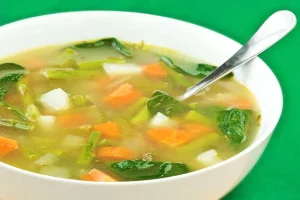The Cabbage Soup Diet, known for its promise of quick weight loss, has garnered the attention of individuals seeking a rapid solution to shed pounds. While this diet may offer immediate results, it is not without its potential pitfalls and side effects. In this article, we will explore the concerns and warnings from dietitians regarding the Cabbage Soup Diet, helping individuals make informed decisions about this weight loss plan.
Understanding the Cabbage Soup Diet
Before we delve into the concerns and side effects, it’s important to have a clear understanding of the Cabbage Soup Diet. This diet is a seven-day, low-calorie regimen that centers around homemade cabbage soup. The daily meal plan includes specific combinations of foods alongside the cabbage soup, and it typically looks like this:
- Day 1: Cabbage soup and fruit (except bananas)
- Day 2: Cabbage soup, vegetables (no starchy vegetables), and a baked potato with a small pat of butter
- Day 3: Cabbage soup, a mixture of fruits and vegetables (no starchy vegetables)
- Day 4: Cabbage soup, up to eight bananas, and skim milk
- Day 5: Cabbage soup, lean protein (e.g., beef, chicken, or fish), and tomatoes
- Day 6: Cabbage soup, lean protein, and vegetables
- Day 7: Cabbage soup, brown rice, vegetables, and unsweetened fruit juice
image by: https://www.gimmesomeoven.com/spring-vegetable-minestrone/
Concerns Raised by Dietitians
While the Cabbage Soup Diet may deliver quick results, it has raised significant concerns among dietitians:
1. Nutritional Deficiency
Concern: The diet is significantly deficient in essential nutrients. It provides limited protein and lacks healthy fats, increasing the risk of nutritional deficiencies.
Impact: Nutrient deficiencies can lead to health problems, including muscle loss, weakness, and fatigue.
2. Short-Term Focus
Concern: The Cabbage Soup Diet is designed for short-term use, focusing on quick weight loss rather than sustainable, long-term health and well-being.
Impact: The short-term focus may lead to a cycle of weight loss and regain once regular eating habits are resumed.
3. Limited Variety
Concern: The repetitive nature of eating cabbage soup for an entire week can lead to boredom and dietary monotony.
Impact: Limited variety can decrease overall satisfaction and adherence to the diet, making it challenging to maintain.
4. Potential Side Effects
Concern: Rapid weight loss can lead to side effects such as dizziness, fatigue, and irritability.
Impact: Side effects can hinder daily activities and overall well-being.
5. Water Weight Loss
Concern: Much of the initial weight loss on the Cabbage Soup Diet is due to water loss rather than sustainable fat loss.
Impact: Water weight loss is temporary and often leads to rapid weight regain once regular eating habits are resumed.
Dietitians’ Recommendations
Dietitians offer recommendations for individuals considering the Cabbage Soup Diet:
- Short-Term Use: The Cabbage Soup Diet should only be used for a very short duration, such as a jumpstart to a weight loss journey. Long-term use is discouraged.
- Consult with a Professional: Individuals should consult with a registered dietitian or healthcare professional before making significant dietary changes or embarking on any extreme diets.
- Balanced, Sustainable Approach: The primary focus should be on adopting a balanced and sustainable approach to weight management, which includes a variety of nutrient-rich foods and regular exercise.
- Avoid Yo-Yo Dieting: Yo-yo dieting, which involves repeated cycles of weight loss and regain, can be detrimental to overall health and well-being. Instead, aim for gradual, sustainable changes.
Photo by Connor McManus: https://www.pexels.com/photo/a-close-up-shot-of-bowl-of-pho-11783315/
In Conclusion
While the Cabbage Soup Diet may offer quick weight loss, it is not without its potential pitfalls and side effects. The concerns raised by dietitians include nutritional deficiencies, a short-term focus, limited variety, and potential side effects such as dizziness and fatigue. Dietitians emphasize the importance of a balanced and sustainable approach to weight management that focuses on overall well-being. The Cabbage Soup Diet, in its traditional form, is not intended for long-term use, and individuals should consider the potential risks and benefits before deciding to embark on this dietary plan.












